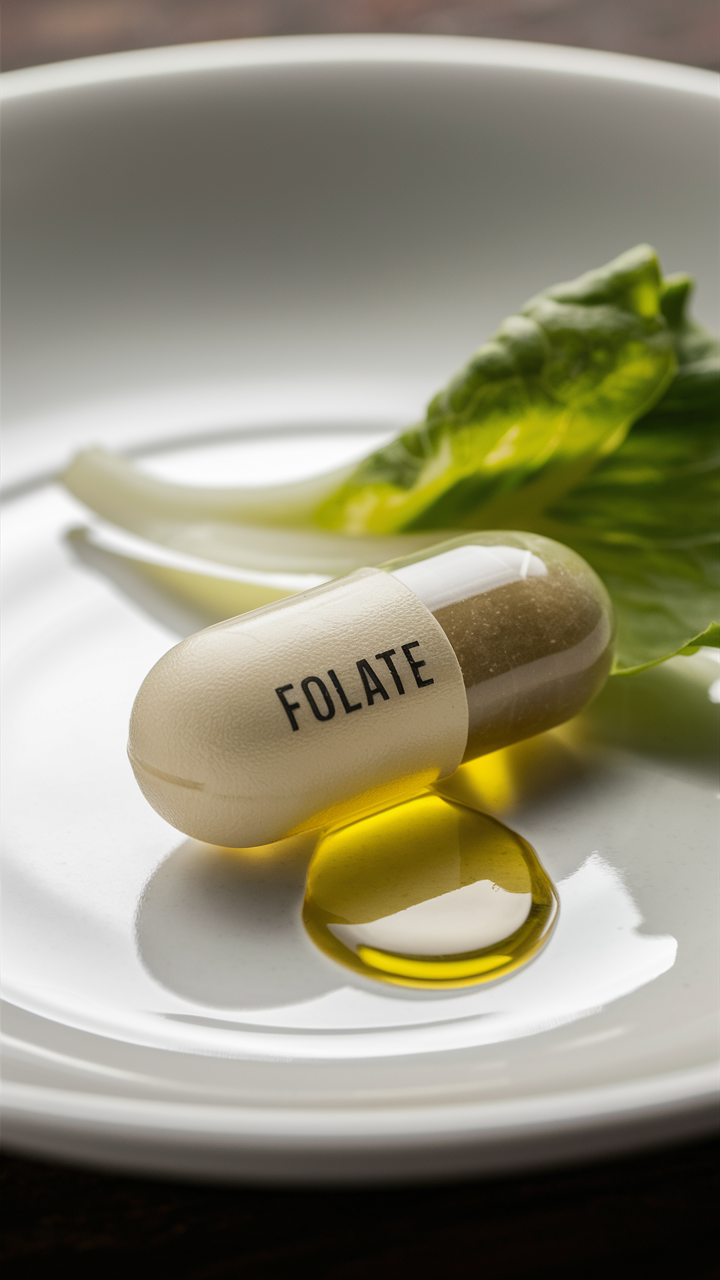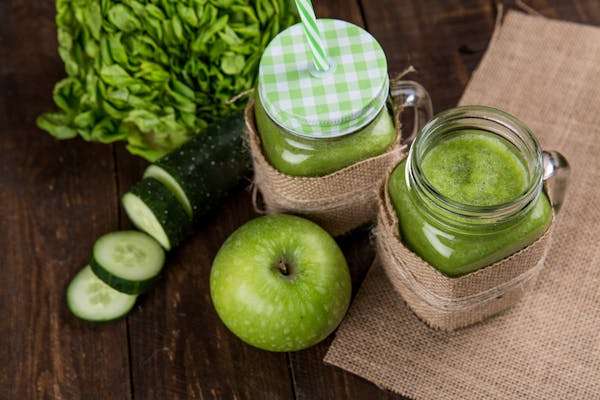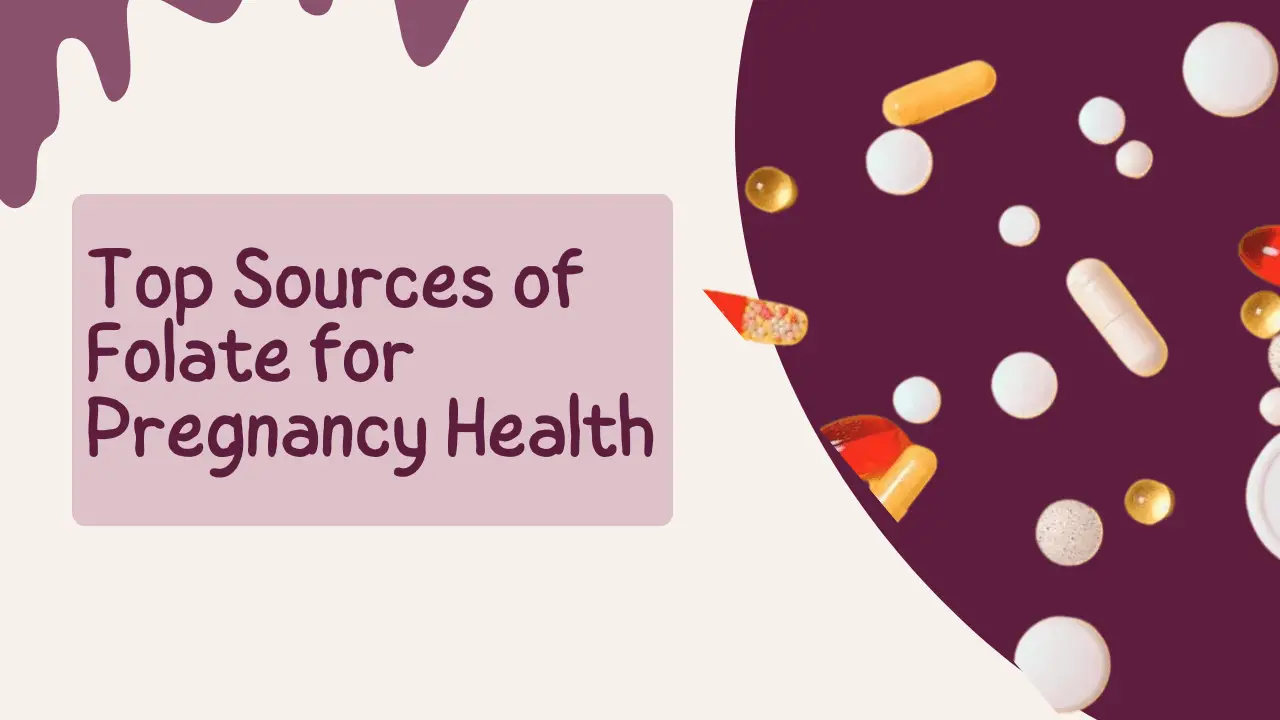For expecting mothers, folate is an essential nutrient that is critical to a successful pregnancy. A healthy diet rich in folate promotes the neural tube’s development in the fetus, lowering the likelihood of severe birth abnormalities.
We’ll look at the best folate sources in this blog post, which can improve your diet and help you get the right amount of folate for pregnancy health. You’ll discover which foods, from fruits to legumes to leafy greens, are best to include in your daily meals to make sure you and your baby get the advantages of this important vitamin.
What is Folate?
Folate is a water-soluble B vitamin, also known as vitamin B9, that is essential for numerous bodily functions. It occurs naturally in foods and is crucial for the formation of DNA and RNA, as well as the synthesis of amino acids. Folate helps in cell division and growth, making it particularly important during periods of rapid growth, such as pregnancy.
Folate vs. Folic Acid
The vitamin present in food naturally occurs as folate, while folic acid is a synthetic form available in supplements and foodstuffs that have been fortified. Although the body absorbs and uses them in different ways, both types accomplish the same goal.
Because it helps prevent neural tube defects like spina bifida and anencephaly, which can happen if the developing baby doesn’t receive enough folate for pregnancy health.

A balanced diet or supplements containing appropriate folate are essential for promoting fetal development and preserving the mother’s health throughout pregnancy.
Top Dietary Sources of Folate:
To ensure optimal folate for pregnancy health, it’s important to include a variety of folate-rich foods in your diet. Here are some top dietary sources of folate that can help meet your nutritional needs during pregnancy:
- Leafy Greens: Spinach, kale, and collard greens are excellent sources of folate. These vegetables are not only rich in folate but also packed with other essential nutrients like iron and vitamins A and C. Including a variety of leafy greens in your salads, smoothies, and cooked dishes can significantly boost your folate intake.
- Legumes: Lentils, chickpeas, and black beans are legumes that offer a high amount of folate. They are also a good source of protein and fiber, making them a nutritious choice for pregnant women. Adding legumes to soups, stews, or salads can enhance your folate levels.
- Citrus Fruits: Oranges, grapefruits, and lemons are known for their high vitamin C content, but they also provide a good amount of folate. Enjoying these fruits as snacks or in fresh juices can contribute to your daily folate requirements.
- Whole Grains: Fortified cereals, brown rice, and quinoa are whole grains that contain folate. Many cereals are fortified with additional folic acid, which helps boost folate intake. Incorporating these grains into your meals can help maintain adequate folate levels.
- Nuts and Seeds: Sunflower seeds, almonds, and walnuts are good sources of folate. They also provide healthy fats and proteins, making them a valuable addition to your diet. Snack on a handful of nuts or add seeds to your dishes to increase your folate intake.
- Other Vegetables: Asparagus, Brussels sprouts, and broccoli are vegetables that are also rich in folate. These vegetables can be enjoyed steamed, roasted, or added to various recipes to enhance their folate content.

Incorporating these folate-rich foods into your daily meals can help ensure you get enough folate for pregnancy health, supporting both your well-being and your baby’s development.
The Importance of Folate for Pregnancy Health:
Folate is an essential component of pregnancy that has a major effect on the health of the mother and the fetus. Helping the neural tube grow and form in the baby is one of its most important roles; this tube eventually develops into the brain and spinal cord.
Sufficient amounts of folate are necessary to avoid neural tube abnormalities like spina bifida and anencephaly, which can have serious consequences for the developing fetus. Furthermore, because of the baby’s quick development during pregnancy, folate promotes general cell growth and repair.
It facilitates the production of DNA and RNA, which are necessary for healthy cell division and the development of new cells. This is especially crucial during the first trimester, as the baby’s systems and organs are growing.
For the mother, sufficient folate helps prevent complications such as anemia, which can lead to fatigue and weakness. It also supports a healthy placenta, ensuring optimal nutrient and oxygen transfer to the baby.
Ensuring adequate folate for pregnancy health through diet and supplements is therefore vital for a smooth pregnancy and the long-term health of both mother and baby.
How to Incorporate Folate into Your Daily Diet:
Incorporating folate into your daily diet is essential for maintaining optimal folate for pregnancy health. Here are practical ways to ensure you’re getting enough of this vital nutrient:
- Start with Breakfast: Choose breakfast cereals that are fortified with folic acid. Many cereals have added folate, making them an easy way to boost your intake. You can also add a serving of fruit, such as oranges or strawberries, to enhance your folate levels.
- Add Leafy Greens: Include a variety of leafy greens in your meals. Spinach, kale, and collard greens can be easily added to salads, smoothies, or cooked dishes. Aim to have at least one serving of these greens daily.
- Incorporate Legumes: Add legumes like lentils, chickpeas, and black beans to your diet. These can be used in soups, stews, salads, or as a side dish. They provide a substantial amount of folate and are also rich in protein and fiber.
- Snack on Nuts and Seeds: Keep folate-rich nuts and seeds, such as sunflower seeds and almonds, on hand for snacks. They can be sprinkled over salads or added to yogurt for an extra boost of folate.
- Include Citrus Fruits: Enjoy citrus fruits such as oranges, grapefruits, and lemons. These fruits are not only delicious but also high in folate. They can be eaten fresh or added to smoothies and salads.
- Choose Whole Grains: Opt for whole grains like fortified cereals, quinoa, and brown rice. These grains can be a great base for meals and help in maintaining adequate folate levels.
By integrating these folate-rich foods into your daily diet, you’ll support your folate for pregnancy health, contributing to a healthy pregnancy and ensuring the well-being of both you and your baby.
Folate Supplements: When and Why to Consider Them:
While consuming folate-rich foods is the best way to meet your nutritional needs, folate supplements can be an important addition to ensure optimal folate for pregnancy health. Here’s when and why you might consider taking supplements:
- When to Consider Folate Supplements:
- Pre-Pregnancy: It’s recommended for women planning to become pregnant to start taking folate supplements at least one month before conception. This helps ensure adequate folate levels are in place to support the early stages of fetal development.
- During Pregnancy: Pregnant women are advised to take a prenatal vitamin containing folic acid, the synthetic form of folate. This is particularly important if you have difficulty meeting your folate needs through diet alone or if you have specific health conditions that may affect folate absorption.
- Dietary Limitations: If you follow a restrictive diet or have dietary preferences that limit folate-rich foods, supplements can help fill the gap and ensure you receive adequate folate.
- Why Consider Folate Supplements:
- Prevent Neural Tube Defects: Adequate folate intake helps prevent serious birth defects of the brain and spinal cord, making supplements crucial for pregnancy health.
- Support Cell Growth: Folate is essential for cell division and growth, which is particularly vital during pregnancy due to rapid fetal development.
- Overcome Absorption Issues: Some individuals may have difficulty absorbing folate from food due to medical conditions or genetic factors, making supplements a valuable alternative.
Consulting with your healthcare provider is essential to determine the appropriate dosage and to ensure that folate supplements complement your overall prenatal care plan, supporting both folate for pregnancy health and your overall well-being.
Conclusion:
In summary, preserving enough folate during pregnancy is critical to the health of both the mother and the fetus. You may guarantee your baby’s development is supported to the fullest extent possible and avoid potential deficiencies by including foods high in folate in your regular diet and thinking about supplements when necessary.
Making these habits a priority can help ensure a safe pregnancy and a happy ending for you and your unborn child. To customize your folate consumption to meet your unique needs, always speak with your healthcare professional.
FAQs:
What is folate, and why is it crucial for a pregnant woman to get it?
Vitamin B9, or folate, is essential for the development and proliferation of cells. In addition to supporting the development of the baby’s brain and spinal cord during pregnancy, it helps prevent neural tube abnormalities.
What amount of folate is necessary for pregnancy?
The recommended daily intake of folate for pregnant women is approximately 600 micrograms (mcg), which can be attained through a combination of diet and supplementation.
Is my diet sufficient to provide me with enough folate?
A balanced diet full of leafy greens, beans, and citrus fruits can provide enough folate for many people, but some may need to take supplements to obtain the recommended daily intake.
When should I begin taking supplements containing folate?
Starting and continuing folate supplementation through the first trimester of pregnancy is advised, ideally one month prior to conception.
Is there a risk associated with consuming too much folate?
Overconsumption of supplements containing folate can conceal a vitamin B12 deficit and cause other health problems. It’s crucial to abide by dose recommendations and speak with your doctor.
